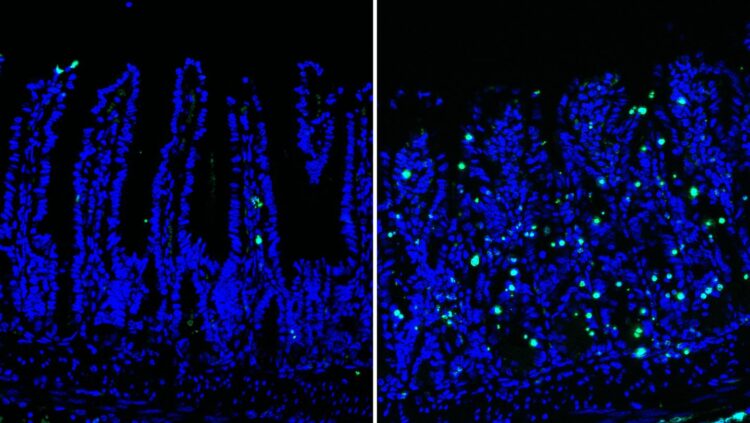Study results contribute to the understanding of intestinal regeneration and prevention of intestinal inflammation

Credit: © CRTD
The intestinal epithelium is the inner layer of the intestinal wall, which separates host tissue from the intestinal microbiota. This layer of cells plays a crucial role in water, electrolyte and nutrient absorption, while limiting the entry of bacteria, viruses, fungi, toxins and antigens into host tissue to ensure intestinal homeostasis. The diverse functions carried out by the intestinal epithelium are supported by multiple specialised intestinal epithelial cells, which are replaced every three to five days from a pool of intestinal stem cells. This makes the intestinal epithelium one of the most rapidly renewing tissues in adult mammals.
Which pathways govern intestinal epithelial differentiation under constitutive conditions? Epithelial differentiation is largely controlled by the tissue-specific activity of transcription factors. Access to DNA is provided by accessible chromatin (euchromatin), while compacted heterochromatin limits access of transcription factors to DNA. Researchers at the TU Dresden Center for Regenerative Therapies (CRTD) have now investigated the significance of the regulation of heterochromatin formation in the intestinal epithelium and published their findings in the renowned international scientific journal Gut.
In their study, Prof. Sebastian Zeißig’s team demonstrated the essential role of the SETDB1 protein involved in heterochromatin formation during intestinal epithelial cells differentiation, and its importance in preventing inflammation. The scientists observed in mice the consequences of the enzyme loss in the intestinal stem cells: Endogenous retroviruses, which represent a relevant part of the human genome, accumulate within a few days, which leads to DNA damage, inflammatory cell death, and loss of intestinal epithelial stem cells as well as of differentiated epithelial cells. This limits the absorption of fluid and nutrients, causes intestinal inflammation and inevitably leads to death within a few days.
“Our study reveals a fundamental importance of SETDB1 and heterochromatin formation in the maintenance of epithelial genome stability and the control of intestinal homeostasis,” explains Prof Sebastian Zeißig, CRTD research group leader and physician at the Medical Clinic I of the University Hospital Carl Gustav Carus Dresden. “It remains to be seen whether mutations in this gene can also contribute to intestinal inflammation in humans, for example, in inflammatory bowel diseases.”
###
The study was funded by TU Dresden / CRTD within the German Excellence Initiative and supported by the DRESDEN-concept Genome Center and the Electron and Light Microscopy Facilities of TU Dresden CMCB Technology Platform.
Media Contact
Prof. Sebastian Zeißig
[email protected]
Related Journal Article
http://dx.





